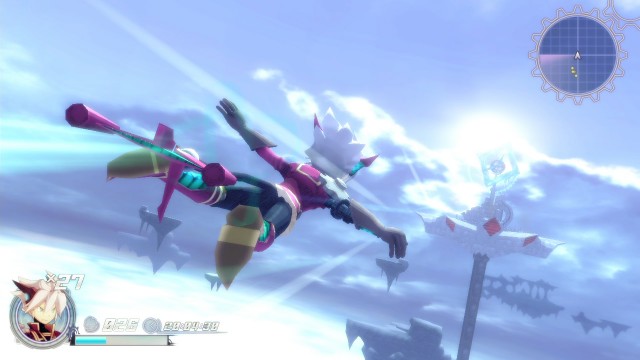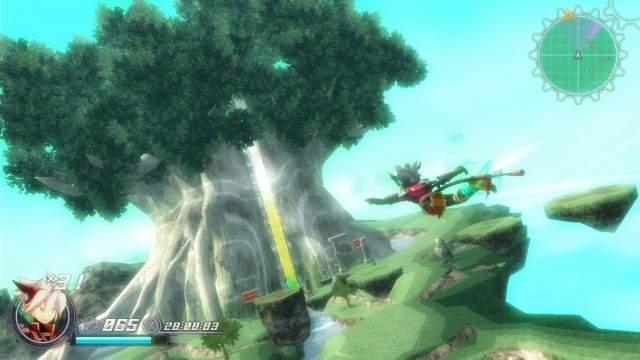Boosted visuals and processing speed accommodate the game's fast action much better on Wii U; Fun controls and gameplay-when they work; Rodea and his world have great art direction
Controls when they don't work, which happens; the camera can be easily confused, having difficulty tracking the action; eye roll-inducing characterization
Rodea the Sky Soldier on 3DS was a middling effort that belied the quality of the concept behind its gameplay. Rodea is at its core about freedom of movement, the rush of flight, and the escape of soaring into the air and charging headfirst at enemies to save the day. Rodea on Wii U luckily does a much better job of conveying creator Yuji Naka’s vision, with vastly superior visuals that make keeping up with the action all the easier. The same issues with hit-or-miss controls and shaky camera work persist on Wii U, but overall this a superior version of Rodea. The inclusion of the original Wii version of the game is also a fascinating bonus that I think makes the Wii U edition of Rodea the copy that fans should make an effort to pick up if they have the choice between it and the 3DS one.
The controls are easy to learn in Rodea, though I don’t know that I’d necessarily say they’re intuitive. Tapping the jump button sends Rodea himself into the sky, and another tap after that brings up a targeting reticule. Aim the cursor toward a land mass or solid object and that’s where Rodea will fly to. It definitely takes some practice to get good at directing Rodea around the game’s numerous environments, but once the basics have been locked down, it’s simple enough to soar, and it’s also very fun. For the majority of the time. Thankfully, Wii U’s ample horsepower makes it much more up to the task of rendering Rodea’s world, and I found that some of the shakiness of controlling the character on 3DS was lessened as a result, but there are imperfections that remain here despite being on graphically-superior hardware.

For one, there are issues where the camera still has trouble keeping up with the action, sometimes leaving players desperately flailing to re-position it so that they can aim Rodea toward solid ground and avoid sending him plummeting into the abyss. That would be annoying enough all on its own, but Rodea can also be stingy with its checkpoints, meaning sometimes that death can bring with it frustrating retreads of previously traversed areas. Rodea’s flight is limited by an energy meter that needs to be replenished by landing or collecting power-ups midair, which oddly isn’t nearly as irritating as one might think it to be. It forced me to be more strategic about planning my flight paths, and though later upgrades to Rodea somewhat render this strategizing moot, it serves to balance out the tricky navigation needed to get through some of the latter stages towards the end of the adventure.
The narrative in the Wii U Rodea is the same as it is on the handheld. Rodea is a robot with a human heart, who fights to protect the kingdom of Garuda from the evil Naga Empire. He’s defeated despite successfully helping to repel the encroaching Naga, and ends up spending the next 1,000 years out of commission and lost in the desert. He’s discovered by a plucky mechanic/inventor named Ion, who reactivates Rodea (conveniently) just in time to fight off the returning threat of the Naga. It’s a decent story, with a couple of fascinating beats that kept me engaged through to the end, but Rodea suffers from Naka’s tendency to suffocate his narratives with insufferably cornball and cheesy dialogue. Ion is notably nauseating, constantly rambling during gameplay unless players go and manually reduce how chatty she is in the options menu. The cut scenes are well rendered, and I was thrilled by how realized Rodea’s world felt, but Naka really needs to reconsider how grating his storytelling can be at times. Rodea is portrayed as being a tough soldier type, replete with a heavy arsenal and suite of attack moves (more on that below), but a monkey wrench is thrown into the works when suddenly the game veers into the goofball storytelling of a bad Saturday morning cartoon; the two tones simple don’t mix. Rodea can certainly be interesting in spurts, but too often I found myself wishing he and Ion didn’t speak at all.

Combat goes hand in hand with flying, as the bulk of Rodea’s attacks come from his ability to lock onto enemies and hurl himself at them like a heat-seeking missile. Mechanically, shooting Rodea off at baddies is handled almost identically to making him fly, with the main difference being an additional tap of the attack button added into the mix. Rodea also has access to an energy rifle and boost pads that let him zoom across the ground like a certain blue hedgehog, dealing damage to any enemies that he touches. Sadly, neither the shooting nor running is as compelling as flying and launching at bad guys, but they’re a nice change of pace when the game incorporates them. I mentioned above that the camera can be frustrating just in trying to get Rodea to fly from point A to B, but when it comes to brawling it can become downright infuriating. The camera gets lost and confused by the flurry of action in sending Rodea ricocheting between foes, requiring frantic adjustments to get the screen pointed back to where it needs to be.
As with flying, this isn’t a constant concern, but it’s a regular one, which is unforgivable. This is the sort of mechanical shortcoming that should have been ironed out during development, but sadly instead was green lit and allowed to hit store shelves. There’s really no excuse for such shoddy design work, and if not for these two glaring flaws, I’d be much more enthusiastic about Rodea as a whole. I can try to look past a troubled narrative if the gameplay is worthwhile, but Rodea barely meets the player halfway in this regard. This is a fun game, and when it’s clicking players will get a thrill from its kinetic and fast action, but expect to spend time wrestling with Rodea’s quirks in order to get the most out of it. Fans of 3D adventure games and Naka’s previous outings will want to keep this on on their radar, but set expectations accordingly; Rodea is a fun but flawed title.
The Wii Difference
It’s hilarious to me that this version of the game feels the most natural, when it’s treated as nothing more than bonus material! The Wii iteration of Rodea comes packed with the first run copies of the game, and Naka himself actually announced on Twitter that he’d like fans to play it, specifically. Was that a subtle indictment of the other two versions of Rodea? Hopefully not, especially because (as you’ve seen in my reviews of both games) neither is terrible by any stretch of the imagination. That said, playing Rodea on Wii it becomes clear that the system was the true destination for the game. The controls here feel the most natural (though still, sadly, imperfect), taking full advantage of the Wii Remote’s excellent motion-sensing capabilities. The Wii version of Rodea feels more unique than either of the other takes, and though it’s nowhere near as pretty to look at as the Wii U iteration, it’s also packing a respectable presentation. Why the motion controls couldn’t have at least been an option for the Wii U Rodea is confusing, and I walked away wishing Naka and company would have given that proposition some more thought before moving forward with the control scheme they ultimately settled upon. I’m pleased that all three Rodea games are available to experience, however, and this bonus disc should act as some compelling frosting for those who choose to buy the game for Wii U.




 ShareThis
ShareThis





